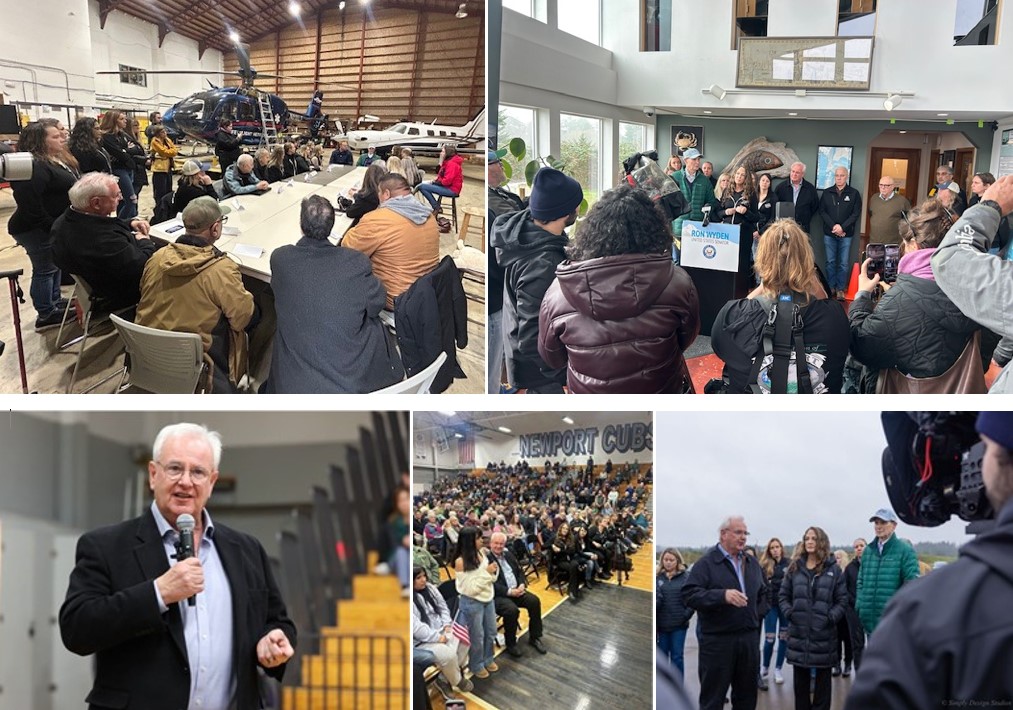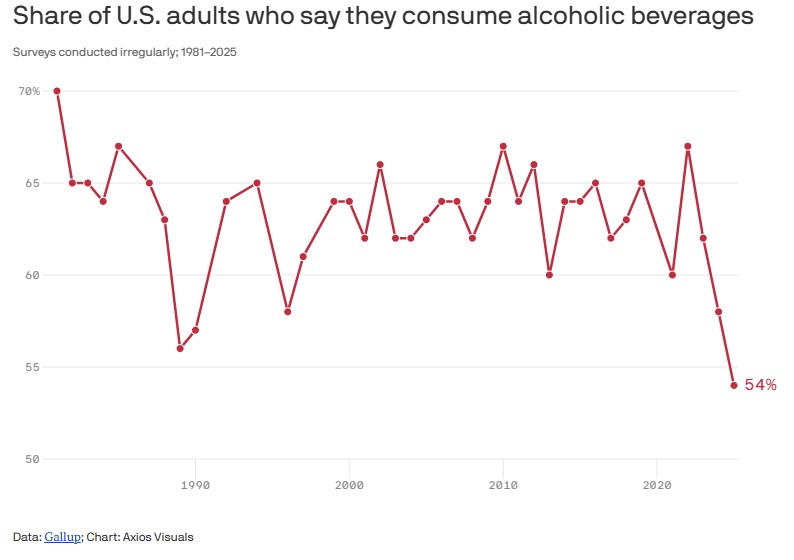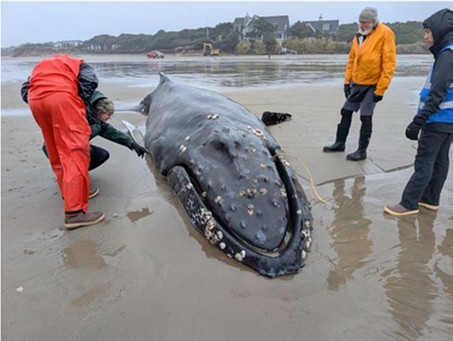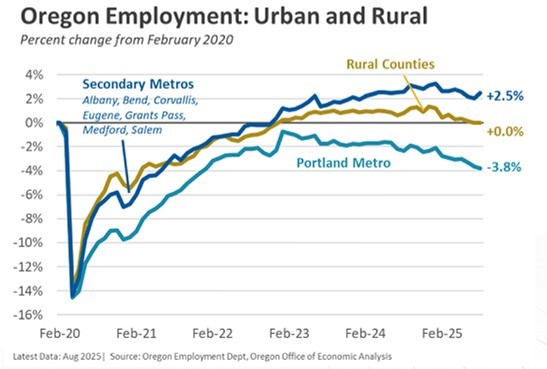By Representative David Gomberg, House District 10
11/24/25
Dear Friends and Neighbors,
It has been quite a week.
The Coast Guard helicopter is gone from Newport, leaving fisherman without lifesaving help and multiple lawsuits to get it back. Evidence continues to build that the federal government is working to base a large ICE detention facility in Lincoln County but no one will confirm or deny this plan. US Senator Ron Wyden held a massive town hall here on Sunday. A juvenile humpback whale, tangled in crabbing lines, washed ashore near Yachats and when rescue attempts failed, was tragically euthanized. The iconic Rogue Brewery was suddenly closed and more than 60 workers left unemployed. And in Salem, legislative committees struggled to reduce agency budgets in response to forecasts that tax revenue is declining. And at the same time, we received a new forecast that the economy may not be as bad as feared just four months ago.
My legislative office – which is to say, myself and my one paid staff person – have been engaged on all of these issues. Let’s take a look at them one at a time.
Newport Fishermen’s Wives joined with Lincoln County to file a lawsuit Friday against the U.S. Department Homeland Security, seeking a judge’s order to return the U.S. Coast Guard rescue helicopter to our coastal city. Today, Attorney General Dan Rayfield filed a separate suit asserting that proper procedures and notice were not followed when the Coast Guard vacated the Newport airport.

The suit comes after we learned the U.S. Coast Guard had either ceased or drastically reduced its operations at the Newport Air Facility and moved its rescue helicopter about 70 miles south to North Bend. Attempts by elected leaders and industry representatives to find out why the helicopter was moved have been met with silence from normally cooperative local Coast Guard commanders. “The abrupt removal of the rescue helicopter and related critical safety infrastructure from the Newport Air Facility puts lives in danger,” the suit says.
A U.S. Coast Guard helicopter that has been stationed in Newport was moved last month to North Bend against federal regulations and without notice or public comment, a lawsuit Friday alleges.
On Sunday, US Senator Ron Wyden was in town and was able to arrange a meeting with the Coast Guard regional public affairs commander. They attempted to justify the helicopter change with an explanation that North Bend still allowed a response within the 2 hour Coast Guard standard. I replied that the national standard means nothing in our unique waters.
Oregon coastal water temperatures average 50- to 54-degrees Fahrenheit year-round, and can cause drowning within one to three minutes of immersion. The stationing of the helicopter further south will reduce critical rescue times from 15 to 30 minutes to 60 to 90 minutes. The Coast Guard is required to notify Congress before any reduction in the use of a Coast Guard air facility and allow for community input and formal risk assessments before the Coast Guard can relocate or reduce an air station.
AG Rayfield added, “The Coast Guard plays an irreplaceable role in coastal safety. If federal officials want to change that footprint, they must follow the law. Sneaking a helicopter out in the middle of the night is not following the law.”
I raised the issue of marine safety and the loss of the helicopter two weeks ago. You can listen my remarks to the Newport City Council here. Read more here and here.
The helicopter’s departure coincides with attempts to lease land adjacent to the Coast Guard’s property at the Newport airport to potentially create an immigration detention center.
Sunday, Senator Wyden, Commissioner Chuck, Mayor Kaplan and I joined Senator Ron Wyden at Newport Airport in a meeting with west coast Coast Guard leadership. Nearly 500 people then attended a Town Hall with the Senator. There is a link to the entire town hall here. You can hear my remarks at the Town Hall here.
| On Sunday, a DHS spokesperson responded to KOIN 6 News’ inquiry regarding the pending lawsuits over the helicopter. Here’s what DHS had to say:
“These efforts to micromanage U.S. Coast Guard operations via lawsuit are completely intrusive, and they obstruct the work of the Service’s patriotic men and women. The Coast Guard is always ready to respond to search and rescue needs on the Oregon Coast, just as it always has been. Any suggestion otherwise is an insult to the hard, heroic work the men and women of the Coast Guard put in every day.”
Newport is a proud Coast Guard town. We support the brave men and women who have selflessly kept our coastline safe for decades. Our only goal is to make their work safer and more effective. If anyone is insulting the hard, heroic work of the Coast Guard, it is the current leadership at DHS that is using them as a pawn in a larger game. DHS seems more interested in belittling the Newport Fishermen’s Wives than they are in giving honest answers to fishing families and elected officials. |
|
| While some have dismissed the reports as “rumors”, there is clear evidence that the Department of Homeland Security is continuing to consider South Beach or the Newport Airport as a site for a large immigration detention facility. Federal contractors are now contacting private landowners about leasing property. Small businesses have been solicited to deliver drinking water and haul human waste away. Online ads seek detention agents, bus drivers, and medical staff – all with ICE experience.
Newport, with a population of 10,000, saw 800 citizens turn out for the City Council on November 12 protesting this prospect. Meanwhile we are seeing increased ICE activity in our coastal communities. |
| Here’s how it works: In the past couple of weeks, a 30-year resident of Lincoln City was detained on his way to work and within hours, was confined at a center in Tacoma. A few days leter, well after midnight, masked agents with dogs came to his home, terrifying his wife and children. If they’d had a warrant, they could have entered the home. They did not.
Let’s be very clear. This is not normal in our Constitutional democracy. People are being stopped and detained without cause or suspicion. They are removed from the state without judicial review or access to an attorney. And they disappear with no information available to their families. Often all that remains is an abandoned car left on the street.
I have been deeply disturbed with my own, personal experiences trying to communicate with ICE and DHS. This isn’t how law enforcement should operate. Lawyers shouldn’t be kept in the dark. Lawmakers shouldn’t be kept in the dark. Our community shouldn’t be kept in the dark.
Reasonable people can disagree about our immigration policies. But I hope we can agree that accountability matters.
Lincoln County Sheriff Adam Shanks and some of his counterparts around Oregon have reported frustration with U.S. Immigration and Customs Enforcement tactics as federal agents ramp-up detentions of people suspected of violating immigration laws.
It has now been over two weeks since we’ve learned about ICE’s plans to bring a detention facility to Newport and their actions to remove our coast guard resources. And in those two weeks, every inquiry from our local, state, and federal officials has been met with complete silence. Every bit of information we’ve learned has come from back-channels but not from the agency themselves.
This isn’t how an honest or transparent government should work. I never thought I’d see the day when secret police can stop people with a certain look and demand to see their papers or try to take families from their home in the middle of the night. That’s not the America I love.
Oregon remains a sanctuary state. That means local police will focus on local crime rather than support immigration actions. And to be clear, anyone committing crimes against people or property can and should be held accountable regardless of immigration status.
Unlawful presence in the US is a civil offense. Immigration proceedings occur in civil court, not in criminal court. And while much has been said about undocumented residents being “killers, rapists, and drug dealers”, the evidence proves otherwise. Recent immigrants are far less likely to be incarcerated than their native-born peers, according to United States Census data. |
| Immigration agents detained four U.S. citizens outside Portland this week, including a McMinnville high school student on his lunch break.
Oregon has about 155,000 unauthorized people living here, and about 101,000 of them immigrated from Mexico. Roughly 10,000 are estimated to be from Guatemala, 3,000 from the Philippines and 4,000 from Canada. (Has anyone seen Canadians being rounded up??) Oregon’s total unauthorized population makes up just 1.1% of the total number of undocumented immigrants living in the U.S.
More than 50% of Oregon’s unauthorized population has lived in the U.S. for 20 years or longer. Of those in Oregon age 16 or older, 71% or 105,000 are employed. The most common industries are accommodation and food services, arts, entertainment and recreation, construction, professional, scientific, management, administrative, and waste management services.
Unauthorized immigrants include both those who entered the country unauthorized as well as those who have overstayed visas. It also includes those who have a pending asylum application, Temporary Protected Status, Deferred Action for Childhood Arrivals, and humanitarian parole.
The immigrant population grew about 6% each year between 2019 and 2023. |
|
| Sadly this week, we also lost the iconic Rogue brewery and a young humpback whale that was stranded on a beach north of Yachats.
Still unknown are the business reasons explaining how a company that established an international reputation for its products and is still listed among the country’s top 50 craft breweries was forced to suddenly close. Certainly the decline in overall alcohol consumption, the loss of Canadian markets in response to tariffs, the expansion of cannabis legalization and large investments by Rogue in craft spirits were contributing factors. Even the Oregon Health Authority (OHA) is encouraging people in Oregon to Rethink the Drink . |
| More than 60 people were employed at the Newport facility.
When the announcement arrived, my office immediately contacted the Oregon Employment Department to begin mobilizing resources available to workers faced with unexpected, large-scale layoffs.
As I wrote last week, please don’t hesitate to contact my office if you are impacted by this layoff and need assistance navigating employment resources. |
|
| A live juvenile humpback whale tangled in lines from a crab pot washed ashore north of Yachats last Saturday afternoon.
Dozens of people flocked to the coast in an attempt to rescue it, including trained responders from Portland and Seattle. But even with the help of a rope-and-pully system used at high tide, they were unable to free the 28-foot-long, 9-ton mammal.
Jim Rice, the program director of Oregon State University’s Oregon Marine Mammal Stranding Network, said the animal was suffering and, with rough seas offshore, had little chance of surviving when officials decided to euthanize it.
“It’s a very sad, tragic situation,” said Lisa Ballance, director of the Marine Mammal Institute at Oregon State University. “There’s no way to spin this positively. I know the general public is heartbroken. It’s hard to watch, hard to experience.”
NOAA Fisheries officials say the gear was left over from the 2023-2024 commercial Dungeness crab season.
Scientists, veterinary students and members of the Confederated Tribes of Siletz Indians worked together to disassemble the whale Tuesday. Tribal members performed ceremonies for the whale, and collected some of its remains for cultural use. Read more here. |
| In 2024, NOAA confirmed 36 entangled whales in the region that includes animals found off California, Oregon and Washington. According to NOAA, the increase in entanglements isn’t simply a matter of more gear in the water. It reflects a mix of recovering whale numbers, climate-driven shifts that pushed prey closer to shore and variable Dungeness crab seasons. In those high-risk years, warming waters pushed krill and anchovy into shallower waters, and whales followed their prey directly into crabbing territory. |
|
| Meanwhile your Oregon legislature was hard at it last week with a series of hearings intended as a first step toward reducing state spending in response to projections that tax revenue will be declining.
The state’s current two-year budget was days old when Congressional Republicans passed H.R. 1, the so-called One Big Beautiful Bill. The massive federal tax cut and spending package is expected to have broad impacts on Oregon’s spending into the future.
Tax cuts within H.R. 1 are expected to reduce the money headed into Oregon’s general fund this budget cycle by nearly $890 million, because federal tax changes impact how much Oregonians owe the state. The bill is also expected to cut around $15 billion in federal funding over the next six years – with many of the cuts coming to health and food programs for low-income Oregonians.
As an initial exercise, state budget writers have directed all state agencies to propose cuts of 2.5% and 5% to their current budgets. We plan to analyze those proposals and prioritize what cuts to carry out when we meet in next year’s session.
Everyone wants more accountability, and less government spending. But increased efficiency often means discontinuing programs that are important to someone. Said another way, reducing budgets is no fun.
In my committee on Transportation and Economic Development, we heard agency suggestions to reduce housing for older or disabled Oregonians, cut funding for county veteran service officers and rides for vets with distant medical appointments, eliminate job creation programs and limit funding for Small Business Development Centers (SBDCs), and even eliminate firefighter apprenticeship training.
You can hear an excellent overview of the situation on KYAQ here.
On Wednesday state economists offered hope that at least some of those cuts can be taken off the table. Stronger than anticipated corporate tax receipts and an expected improvement in the nation’s economic picture have mostly closed a hole in the state’s current budget that economists predicted three months ago.
The state’s economic forecast puts the likelihood that Oregon will slip into a recession at 25%. Even so, the state has shed more than 18,000 jobs in the last year, according to the most recent available data, and its unemployment rate increased faster than any other state’s from August 2024 to August 2025. |
| I’m calling this information a “forecast forecast”. The report we actually rely on to adjust the budget will be presented in January. So this November preview is an indicator rather than a determinant.
And to be fair, I’m skeptical of some of the details reported. The recent federal government shutdown meant that data usually collected on employment, wages, and sales was missing.
There are signs of optimism in this forecast. But nothing in this data changes a core truth. Working families are struggling. As we work to balance the budget, we need to focus on the future: protecting vulnerable Oregonians, creating good-paying jobs, and fighting to lower costs for Oregonians.
We will continue to work on reductions while hoping we won’t need them all. |
|
| The news this week may seem difficult or even daunting. But I remain optimistic. I believe in the resilience and inherent decency of Oregonians. I’m writing this report on a beautiful coastal November evening. Susan and I have visited 50 countries on our travels and there is nowhere on earth we would rather be.
Later with week we will join dear friends to celebrate all the many things we have to be grateful for.
Please enjoy a bountiful, joyous, and in particular, a grateful Thanksgiving. |
|










